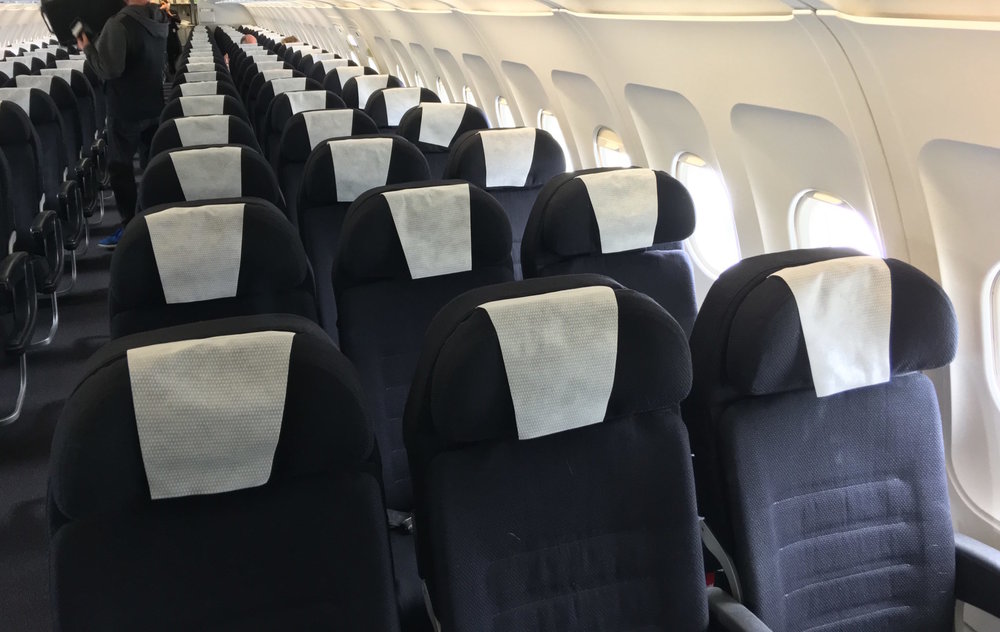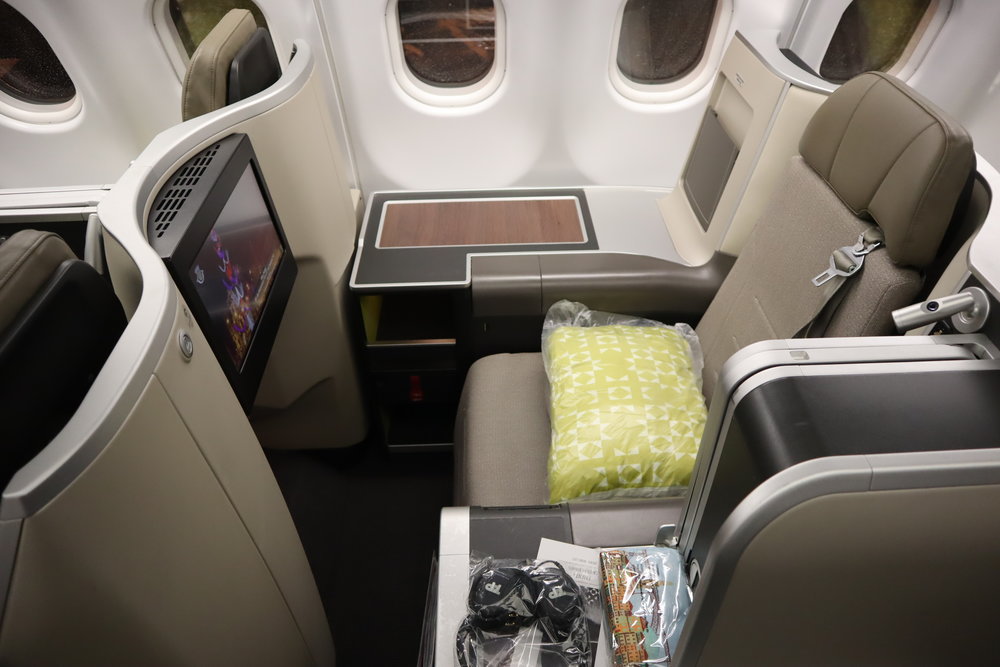I wanted to have a bit of an open-ended discussion today on a relatively simple question. When I describe to others what we do here at Prince of Travel, I’ll typically call it something along the lines of “travelling more, for less”, by collecting and redeeming points.
If I’m feeling particularly grandiloquent, I’ll say something like “travelling the world in style, at a fraction of the price”, again using points.
But what, exactly, is the “point”? I’ve come to observe that among those who start dabbling with Miles & Points, some people focus on “travelling the world in style”, while others zero in on “at a fraction of the price”.

Perhaps unsurprisingly, the points community has a fair bit of overlap with the various other “frugal” communities out there, such as people trying to cut down on their expenses, people working towards early retirement, or people who simply pursue every deal in the land.
With that overlap, there can often be the tendency to ask the question: What is maximizing credit card points and loyalty programs really all about? Is it about saving money, or is it about – as an umbrella term – “living the life”? And it’s an important question, because those with different approaches to the game will be making entirely different decisions in terms of how to use their points.
In this post, I wanted to outline both approaches as I see them, explain why I’m a champion of one in particular, and open it up to the community for debate.
The Money Saver’s Perspective
It’s not hard to see how earning and redeeming points would help a frugally-minded person save money. Indeed, that’s the angle through which many people get introduced to the game at first.
Now, let’s be clear here. There are people out there who are so obsessed with their bank accounts that they starve themselves of every earthly pleasure in the name of compound interest. Let’s assume you aren’t one of those spoonful-of-olive-oil-for-dinner types, and that you live a relatively comfortable lifestyle – you generally enjoy taking your partner or family on one or two vacations a year – but you love to exercise frugality and save money while doing so.
On the face of it, earning and redeeming points is a solid way of accomplishing those goals. A single credit card signup bonus on the Amex Gold Rewards Card, with no money spent out-of-pocket, gets you a round-trip flight within North America. Get your partner to do the same, and now you’ve got that long weekend getaway to Las Vegas sorted.
Why stop there? The Business Platinum Card will get you enough Aeroplan miles for a trip all the way to Asia, albeit with an annual fee of $499. And hey, you could even make it a full-blown Mini-RTW while you’re at it and plan a European stopover on your way to Asia!

Savings vs. Value
But hold on a second. If saving money is the be all, end all, then why would you shell out extra for anything beyond the simple Asia round-trip that you would’ve paid for if it weren’t for points?
A surcharge-free Mini-RTW routing through Europe and Asia would probably run you about $200 in airport taxes and fees. Throw in the $499 annual fee, and you’re $699 out-of-pocket already. Then remember that you had to spend $7,000 on your Amex to earn those 75,000 miles, and if you had put that spending on a 2% cash back card instead, you’d have earned $140. Opportunity costs, don’t forget those…
So yes, the Aeroplan Mini-RTW is an excellent sweet spot that provides great value. If your goal is to save money, though, do you really care about value? Surely, instead of paying an effective $200 + $499 + $140 = $839 out of pocket, you’d be better off buying a cheap fare of about $500 to bring you to Asia?
And that’s to say nothing of redeeming points for business class. Sure, a business class award is much better value, but it also requires 150,000 miles – double the economy cost – to begin with. If frugality were the mandate, you’d be best-advised to save those miles for next year’s economy class trip instead of burning them now in business class.

Just as you shouldn’t forget about opportunity costs when earning miles, you shouldn’t overlook them when redeeming either. Points are a currency, and they have an inherent cash value – with Amex MR points, for example, you always have the option of cashing them out at $0.01 apiece against any purchase.
So when you’re entertaining the possibility of booking business class, the question you’re really asking is: would you buy-up to business class by spending an additional $750 (the floor value of the incremental 75,000 miles) that you didn’t really need to spend? And for a good money saver, there’s only one right answer…
Indeed, after mulling it all over, the best course of action from a money-saving perspective might be something like this: grab both the Gold Rewards Card and the Business Platinum Card for 100,000 MR points in total. Use 50,000 MR points to offset the $499 annual fee you paid as a statement credit. Then use the remaining 50,000 MR points to book a cheap $500 fare to Asia, all-in.
You wouldn’t get good value out of your points; in fact, the value in the traditional sense would be downright terrible. But if it allowed you to book the trip you’d ordinarily book, while paying nothing out-of-pocket, and thus accomplishing your end goal of saving money – then who is anyone to tell you it’s the wrong way to use your points?

The “Living the Life” Perspective
I hope the above illustrates how saving money and attaining good value for your points can often be at odds with each other.
Those in the opposite camp, meanwhile, recognize this fact and therefore do not view saving money as an objective of collecting points, in and of itself. Instead, the goal is to use points to attain unique experiences that would otherwise be far out of reach – in other words, to “live the life”.
This perspective is what drives many of us to pursue business class and First Class redemptions, to redeem points for stays at awe-inspiring luxury hotels and resorts, and to travel to far-flung corners of the globe. For most of us, the retail prices of these experiences would be drastically out of our budgets, but equipping ourselves with Miles & Points makes them, all of a sudden, very much within reach.

You could be a relatively well-off company executive, but even then, you probably won’t be dropping tens of thousands of dollars on international First Class on a regular basis. Well, points can make it happen. You could be an ordinary middle-class family with the budget for one vacation a year, but the appetite for three or four, or even more. Again, points can make it happen.
You could be a university student with aspirations to travel the seven seas, but very little money in your bank account. Points can make it happen – indeed, that’s where my journey with this stuff all began. The idea is that Miles & Points allow you to do awesome, unforgettable, and frankly life-changing things that cash alone would not, and that’s the perspective I’ve championed since the very start.

Note that I’m not dismissing the importance of saving money – everyone knows that compound interest is one of the keys to a stable financial future – but that’s the domain of RRSPs and TFSAs. It’s just that when it comes to Miles & Points, saving money is not the end goal.
Instead, saving money is couched within the context of maximizing value. One example of this would be my ANA First Class trip last year, where I used some Aeroplan hidden-city ticketing to bring the taxes and fees from $200 down to $100. Or when I opportunistically pounced on the US$980 Cathay Pacific First Class mistake fares on New Year’s Eve. Or the time when I updated the address in my Aeroplan profile to my Beijing address, so that I’d count as a foreign resident and wouldn’t have to pay the HST on any change fees or phone booking fees (a neat little trick, by the way).
All of the above are examples of attempts to save money for the purpose of maximizing value and living the life, not instead of it. For me, having this abundance mentality is how you get the most out of Miles & Points – let your savings accounts do the savings, and let your Miles & Points do what they do best, which is allow you to comprehensively enjoy your life through some incredibly rewarding travel experiences.

The Value Debate
Lastly, it’s interesting to note how this question ties into the debate that regularly occurs whenever the concept of “value” itself gets discussed. On paper, using First Class retail prices, you can often get upwards of 15 cents per point (cpp) on your points redemptions, but how accurate of a measure is this really?
Those who focus on saving money and cost minimization are quick to compare against the benchmark of “what you would have paid”; according to them, since you never would’ve paid those exorbitant retail prices in cash, it’s totally unfair to say you got 15cpp for your points.
On the other hand, those who adopt the mindset of “experience maximization” will emphasize that the retail price is in fact the fair price of the redemption on the free market, so the 15cpp valuation accurately represents how amazingly they used their points. The fact that they never in a million years would’ve paid cash for it simply underscores that idea.
Alas, this is one of the debates that has raged on since the day the very first frequent flyer mile was issued. Both arguments have their merits, so there’s no real clear-cut answer, but the conversation does serve to highlight the opposing viewpoints held by people who are using their points to accomplish different objectives.

Conclusion
I’d love to hear your thoughts on where your primary objectives with Miles & Points lie. If you’re intent on saving money, and can use points to help you make progress towards that goal despite putting aside the notion of value, then no one has the right to tell you you’re redeeming points the wrong way. On the other hand, if you’re set on living a high-flying lifestyle that relatively few people in this world will ever get to experience, then there’s nothing that gets the job done better than Miles & Points either.
Ultimately, as with all things in life, there should be a balance between saving money and indulging in earthly luxuries. For me, that balance is struck when the former is objective is pursued diligently in the name of the latter. What about you?



















Hi,
I am fairly new to all this and have only been following this blog for about a year. I have been collecting aeroplan points for a long time and I used to do the CIBC, TD aeroplan card and AMEX gold card churning for about 4 years. I managed to get the annual fees waived 90% of the time so it was pretty much free points. Low points but still free.
In the last 10 months I have gone through the AMEX cycle once and it has been awesome. I am about to embark on my first miniRTW trip in business class to South/Central America. Looking forward to sleeping on the plane and get the most sight seeing done instead of losing half a day recovering from the long flights.
My perspective at the moment is to use my points to travel to places I had planned on travelling. This will give me more money to spend at the places or take more flights within the region outside of the flights to get there. I can also visit more places. Now I just have to somehow manage to get more vacation time so I can squeeze in 3 international trips per year instead of 2.
The other dilemma is that just using my natural spending I am barely able to hit all the spending requirements for the cards I am churning. I have not found a good method to manufacture spending and thereby get to the next level of points collecting.
I am also looking into getting US credit cards and trying to figure if it is worthwhile. 2 things are holding me back (besides the amount of work it takes)
a) can I find a natural method of meeting the spending requirements without having a good manufactured spending method
b) if using the US credit cards in Canada primarily, is it worth it due to the foreign exchange that will be charged on non-USD purchases.
In either case, this blog has helped me refine my plans a lot. Now I just got to use up as many of my points before June 2020, which will be difficult since I can only do 2 miniRTW per year.
Keep up the good work Ricky and thanks for answering all the questions I have had
Thanks
Alex
I collect about 2M points per year through natural business spend. (I can boost this by 15-25% through churning).
At $0.01/pt this represents a conservative minimum $20-25k annual bonus if used to "save money" and book Y fares or statment credits. (although I will use points for Y in high season, or when I can get more than 0.02cpm).
Meanwhile taking 5-10 long-haul flights in F and J while staying in aspirational hotels with my wife, family, or friends, represents an annual bonus of approximately $200k per year at a $0.10/pt valuation. Then think, marginal income tax would be 50% in that bracket, so now that $200k in travel would actually value closer to $300k in pre-tax income.
How’s that for opportunity cost? 😉
Great post as always! Theoretically we all would love to travel using all of these principals but in my (and assumingly all) travel experiences we situational travel. As mentioned mortgages, savings, affording life seemingly always gets in the way for everyone and this is why we off set the travel with points. I don’t think my experience are opportunistic travel but rather situational. As a teacher travel at peaks times all the time requires proactive planning and resources to see value, redeem value and “save” money in the process. I will always and have always redeemed 25k aeroplan miles for a RT to Florida at Christmas over forking out $1200-$1500 in cash value. On the opposite end of this spectrum I have also spent $321 for a oneway ticket to LHR from YYZ to connect elsewhere over the 30k AP miles for the same flight. For me travel is part of life experience and I want that for my children and my value will ultimately be different then others due to situational travel for many different reasons.
In my opinion, I spend money on credit cards and I spend money on travel no matter what, so why not make the most of it!
When I was younger and had a mortgage, my priority was to save money (in absolute dollars). Even though the mortgage is now paid off, most of our spare income now goes towards our children’s RESPs and to a lesser extend RRSPs and TFSAs. However, points and miles allows me go on dream vacations that I would never actually do if I were paying cash. Do points and miles actually save money? I would argue that once the credit card fees and hassle of keeping track of all the credit cards is taken into account, the savings is marginal compared to paying cash and travelling in economy, which is the only travel I would consider paying for out of pocket. However, with points and miles I can now send my parents in business class for less than the price of an economy ticket. Helping those you love, who have worked hard all their lives makes it totally worth the effort. And this year I’ll get to enjoy business class with them. 🙂
Thanks for your input, John. Agreed that points might not actually save you money at the end of the day – in addition to the things you mentioned, you’re very likely to spend more money out-of-pocket when you’re travelling more compared to when you’re staying at home. That’s why my position is that points aren’t there to help you save absolute dollars, but instead to help maximize your travel experiences for you and your loved ones – and like you mentioned, sometimes sharing it with your loved ones is indeed the best part.
Excellent post, Ricky! I really enjoy your reflective posts and you are hands down the best Canadian blogger. I have been thinking about the utility of this game for an average collector, not someone who can build a business from this.
1) What is the value of these rewards? Let’s use your 2 player mode example, "543,000 MR points, 72,000 MR Select points, and 251,000 Marriott points. The cost? A not-at-all-insignificant $3,246 in annual fees and $59,500 in minimum spending." I would venture that most couples won’t be able to meet this yearly without MS. Nevertheless, let’s assume 3 mRTW, 5 nights at top hotels. Let’s value it at $25,000 for the above, so the net gain is around $22K/year. However, would you exchange $22K for all your points, $20K, 15K? I think most people would, so the real value is much less.
2) Time vs savings. It’s not easy to book mRTW for an average collector. you have to be flexible with travel, be able to get time off, etc. And does this really fit in with your personal travel plan? Are you travelling more to get "good value."?
3) Perception vs reality. It feels great to sit in a first class lounge, eat nice meals on plane and sleep flat. On the other hand, it’s still a small space, uncomfortable bed and less than Michelin star meal.
4) I think this is the big one, opportunity cost. How much time does this hobby take? Just to know the basics, it take many hours reading blogs, reddit, etc. What about the actual travel time? What if this time is invested in further education, career advancement, etc? Would that pay off much more than perceived value from points redemption?
This is off topic, but something I wondered about. Most travellers extol the value of travelling as a way to meet new people, learn new culture and gain different perspectives. However, I don’t think it’s true. You could go Alabama and if you only stay in the capital city, you won’t know it’s a conservative territory. My feeling is that your experience will be skewed depends on who you meet (and keep in mind, most people in the city has to work, study and won’t have time to entertain a stranger). I would think you could gain much more by reading on the topics, and save much more time!. Not to say travelling is not important or fun, but I don’t think one should use this for gaining knowledge/perspective etc.
Just my thoughts, curious to see what other think.
Great points you make, BG, and thanks for the input. I agree that most people (including myself) would definitely exchange $22k for that bundle of points. I think the real value lies somewhere close to what the points can be bought/sold for on the grey market, which would be roughly $8-9k.
2) and 3) tie into the same point, I think, which is the "special" exclusivity factor that drives much of these redemptions. While I personally relish the versatility of the Mini-RTW and how it allows me to visit 3+ places in one go, others might not otherwise take such a trip, but still do so using points in order to have a unique and awesome experience. Similarly, you’re right in that I’d much rather sleep in a Westin Heavenly bed and go for dinner at a Michelin star, but put it all together on a plane and you have a travel experience that maybe 0.001% of people will ever get to have, and that’s what makes it such a "special" thing to use your points for.
4) is a very good point, and something I’ve grappled with myself. The way I resolved it was to realize that travel is one of my biggest passions, so if I were to invest that time in my career advancement, I would end up spending the extra money on travel anyway. And if I advanced my career to such high levels to be able to afford business class tickets, that’s what I’d do – so why not take the faster route there via points? (Believe me, this was a very real struggle for me back when I was deciding about leaving my corporate job to focus on PoT.)
On your last point, I (strongly) disagree. Sure, if you went to the cosmopolitan parts of Montgomery, AL, you wouldn’t get the full picture of Alabama… but you’d have a picture of one part of it. Anyone who claims to know an entire region from one city is being rather intellectually dishonest anyway.
You can read all the books in the world, but nothing shapes your perspectives and narratives like being on the ground and seeing things for yourself. I find that with travel, as with most things in life, research is key but experience is always the best way to learn. But then again, this is all very much a personal thing, and the fact that we all experience travel in different ways is what makes it so special.
Hi Ricky:
My perspective is already expanding by this email exchange!
I am interested in your perspectives on travel and growth it led. I understand some value the experience and that’s what draws them year after year. I don’t think it’s a black/white, all/nothing issue and everyone needs finds their balance. Just like points, I resolved to continue collecting but use it on aspiration trips maybe every few years and pay cash for others.
I’m kinda at a cross roads in my Miles and Points journey – I’m “rich in miles and points” but “time poor” in actually using them.
Also, I’m somewhat caught up in the whole value aspect of my miles and points in the sense that I want to save them if the value is poor in hopes that I’ll be able to have a much better opportunity to use them in the future. Opportunity costs are knocking… use 75K now for a NA flight for 3 at the cost of not being able to have enough points for a mini-rtw for 2 in the future.
Opportunity costs are indeed very important to consider. But the richer you are in points, the lower the opportunity costs of a specific amount of points (because you have so many more points to use for alternative redemptions). So if you grow richer and richer in points, but remain "time-poor", then eventually you might be looking at long weekends in Europe or something like that 😉
That is exactly it. I have done <24hrs in Eu/Asia over the course of a weekend, plenty of times.